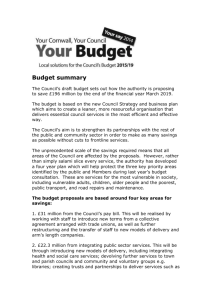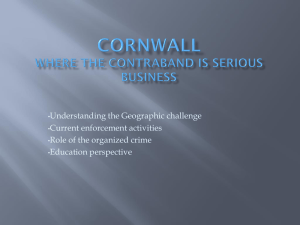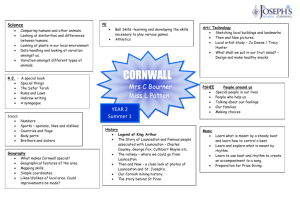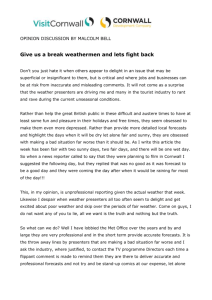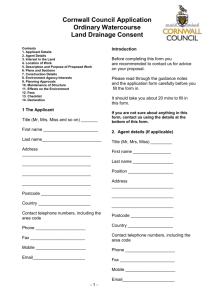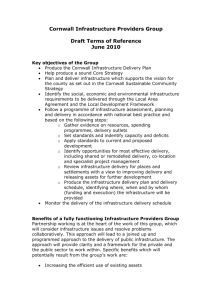Sustainable construction policy
advertisement
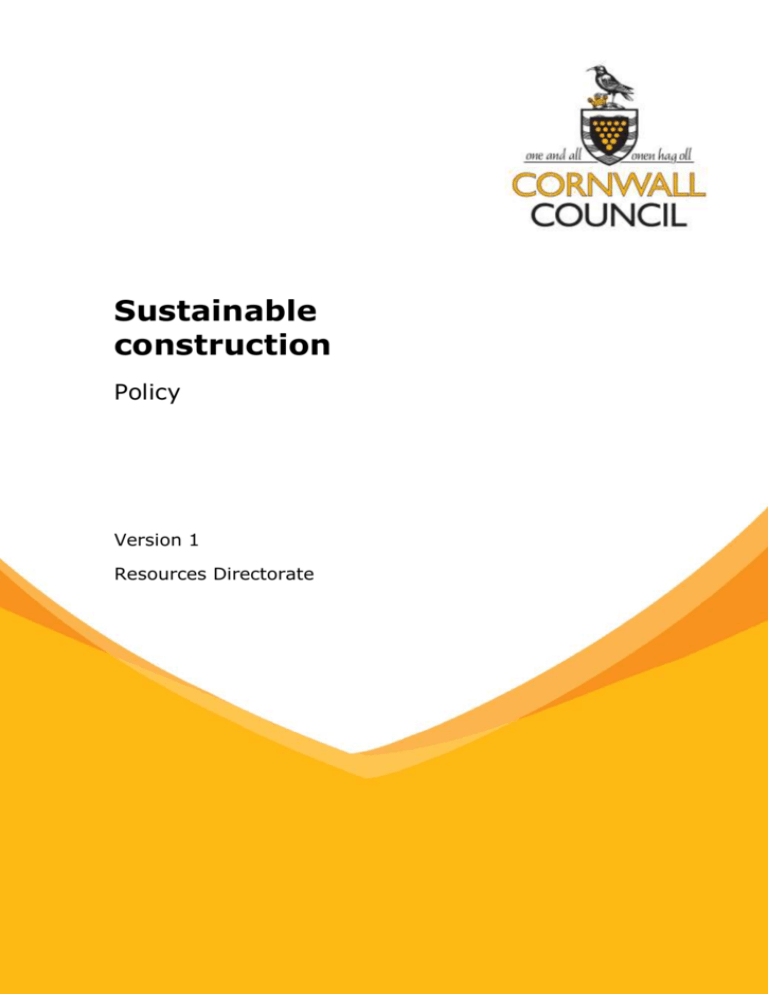
Sustainable construction Policy Version 1 Resources Directorate Sustainable construction Policy Compliance 3 Scope of policy 3 Definition of sustainable construction 3 Sustainable construction Policy Version 1 2 Scope of policy 1. This policy applies to the planning, design, procurement, construction, use, maintenance, refurbishment and decommissioning of Cornwall Council’s buildings. Definition of sustainable construction 2. The Council defines sustainable construction as “the design, construction, maintenance, refurbishment and decommissioning of buildings and associated infrastructure that is fit for purpose, resource efficient and will not compromise the health of the environment or the health of building occupants, builders, the general public or future generations.” Compliance 3. The Council will comply with the following: • Assessment of need – Before any construction development is provided, refurbished or extended, an assessment of the need will be carried out to address whether the desired outcome(s) can be achieved by alternative, sustainable means – It is a requirement set down in the Council’s capital strategy that all projects costing over £0.5m require an option appraisal that considers the optimum solutions to achieve desired outcomes (including sustainability) • Design of construction development – Design quality forms one of the key aims of the Council’s building standards and will form an integral part of the project design brief • Location of buildings – Buildings will preferably be sited on previously developed sites (subject to planning or environmental constraints). Transport assessments and travel planning (including congestion, energy use and emissions) will be taken into account for users of services as well as staff. – As significant areas of Cornwall’s previously developed land is related to the mining industry (and some of this is of importance for historic or biodiversity reasons), option appraisals will be essential to establish the balance between developing brown and green field development. History, biodiversity, the market place and land contamination issues will all play an important role in site identification. – Travel to use council services will be minimised if developments and services are located as close as possible to those who need Sustainable construction Policy Version 1 3 to use them. Wherever possible proximity of the services to and access by rail, bus, walking or cycling should be considered. • Energy and water – Construction management and development will be efficient in use of energy and water and will make use of energy from renewable sources where practicable – Energy issues to be taken into account include the energy associated with the manufacture, transport, use, maintenance and decommissioning of the building or infrastructure as a whole, as well as the embodied energy of component materials and products – Buildings will be designed to be energy efficient and renewable energy will be utilised where the targets for reductions in carbon dioxide emissions from the project are beyond those gained by improvements in energy efficiency for similar expenditure. Unless used for demonstration or promotional purposes, renewable energy systems will be subject to suitable appropriate payback periods. • Materials and resource efficiency – Specifications will be expected to use suppliers who provide materials which are more environmentally acceptable (in accordance with the following procurement hierarchy), whilst also taking into account local availability: – Buy re-used or reusable – Buy recycled or recyclable – Buy renewable from sustainably managed sources – Buy raw, finite materials • Environmental impact of materials – The environmental impact of materials used in construction will be taken into account and minimised as far as practicable in the selection process • Halving waste to landfill – The Council is committed to the waste and resources action programme, which has set a target of halving the amount of construction waste going to landfill by 2012. A critical vehicle for implementing this is the construction framework agreement which will be responsible for delivering major capital projects over this period. • Procurement practice – Tenders will be designed to encourage suppliers to adopt good environmental practices. The use of local labour, training, design and creativity will be maximised within practical constraints to help support the local economy. Sustainable construction Policy Version 1 4 – Cornwall is committed to sustainable procurement practice through its corporate procurement strategy for 2005-08. Prepared by: Chris Jackson Policy and Training Manager Property Services 12 February 2016 Sustainable construction Policy Version 1 5 If you would like this information in another format please contact: Cornwall Council County Hall Treyew Road Truro TR1 3AY Telephone: 0300 1234 100 Email: enquiries@cornwall.gov.uk www.cornwall.gov.uk Sustainable construction Policy Version 1 6
